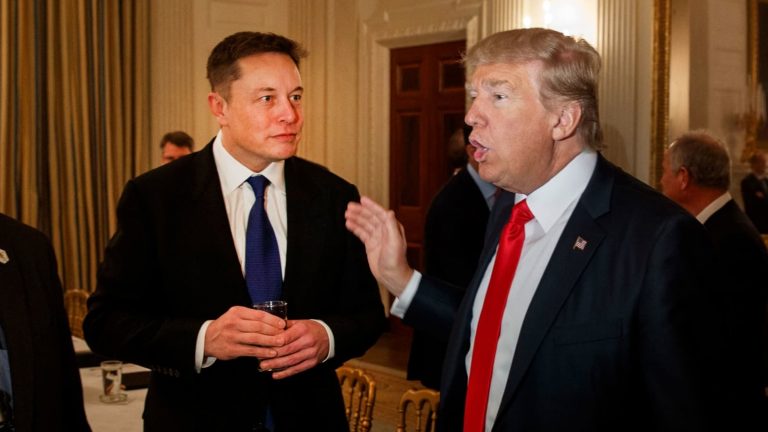
Tesla CEO Elon Musk has taken a public swipe at President Donald Trump’s top trade advisor, Peter Navarro, in what many insiders see as a veiled rebuke of the Trump administration’s sweeping new tariff regime, a policy that could further erode Tesla’s already slowing growth.
“A PhD in Econ from Harvard is a bad thing, not a good thing,” Musk wrote Saturday on X, formerly Twitter. “Results in the ego/brains>>1 problem.”
Navarro, 75, who earned his master’s and doctorate from Harvard and currently serves as Trump’s senior advisor on trade and manufacturing, brushed off the insult in a Fox News interview. But behind the scenes, many in Trump’s circle acknowledge that the rift between Musk and the administration may be deeper than they’re publicly admitting.
Register for Tekedia Mini-MBA edition 19 (Feb 9 – May 2, 2026).
Register for Tekedia AI in Business Masterclass.
Join Tekedia Capital Syndicate and co-invest in great global startups.
Register for Tekedia AI Lab.
“Look, Elon, when he’s in his DOGE lane, he’s great,” Navarro said on Sunday Morning Futures. “But let’s understand what’s going on here—Elon sells cars. He’s protecting his own interests, as any business person would do.”
Navarro’s tone was light, but Musk’s criticism came just days after Trump rolled out a sweeping tariff policy that imposes new taxes on imports from more than 180 countries, starting at a baseline rate of 10%. Trump, who announced the measure during a rally on what he called “Liberation Day,” claimed the move would “make America wealthy again” by encouraging U.S. manufacturing.
However, economists warn the policy could do the exact opposite, particularly for American automakers like Tesla, whose global supply chains and export markets are being directly hit by the new duties.
Tesla, which relies on imported parts for its U.S. manufacturing and exports thousands of vehicles from its Gigafactory in Shanghai to Europe and elsewhere, stands to be one of the hardest-hit American automakers under the new tariff regime. Analysts say the policy could sharply raise the cost of key components, reduce competitiveness in foreign markets, and trigger retaliatory measures from other countries.
Tesla has already been facing a tough year. The electric carmaker’s global deliveries fell nearly 8% in Q1, its biggest year-over-year drop since the pandemic. With competition rising in Europe and China, and price wars eating into margins, Tesla is under pressure to show growth again. Analysts have downgraded the company’s stock, pointing to stagnating sales and weak consumer demand in key markets.
Musk, once an enthusiastic Trump backer and currently serving as a “special government employee” under the Department of Government Efficiency (DOGE), has supported the administration on a range of issues, from deregulation to free speech. But the tariff dispute may mark the beginning of a serious ideological split.
Behind the Musk–Navarro Clash
While Musk’s dig at Navarro seemed personal, many believe it’s emblematic of a deeper frustration with Trump’s inward-turning economic policy. The jab was widely interpreted as a public denunciation of the administration’s increasingly populist, protectionist direction—one that Musk believes undermines the very global competitiveness America needs to preserve.
Sources familiar with White House discussions say Musk had warned Trump privately in recent months that the auto sector needed “more open markets, not less,” especially as legacy automakers from China and Europe began flooding international markets with cheaper EVs.
Musk’s push for a “zero-tariff” trade pact between the U.S. and Europe, comments he made Saturday while attending a meeting with Italy’s League Party, also underscores his divergence from Trump’s hawkish stance. He even suggested a freer immigration policy between the two continents.
“If people wish to work in Europe or wish to work in North America, they should be allowed to do so,” Musk said, comments that stand in stark contrast to the Trump administration’s more restrictive posture on labor and immigration.
Though Navarro downplayed the spat, insiders suggest Musk’s jab may mark the beginning of a cooling relationship with Trump’s administration—one that had, until now, positioned Musk as an indispensable outsider-insider. As head of DOGE, Musk was tapped to bring Silicon Valley efficiency to federal operations. Trump, who frequently praises Musk, has said he hopes the tech billionaire stays on “as long as possible.”
But federal law restricts special government employees like Musk to 130 days of service per year, and there are signs that both sides are bracing for a natural, if increasingly tense, conclusion to the arrangement.
“Elon Musk and President Trump have both publicly stated that Elon will depart from public service as a special government employee when his incredible work at DOGE is complete,” White House press secretary Karoline Leavitt said in an X post.
Still, Trumpworld seems eager to keep Musk in the fold. Vice President JD Vance recently said on Fox News that Musk would continue advising the administration even after completing his DOGE assignment. But that loyalty may be harder to maintain if the tariff fallout continues to deepen.
However, for Musk, the battle over tariffs could force a turning point. Once seen as a rare bridge between the tech elite and Trump’s populist movement, Musk now appears caught between his business interests and the administration’s increasingly nationalistic policies.
Time will tell whether his fallout with Navarro becomes a broader split with the White House. However, it is becoming clearer as Tesla struggles to maintain growth that Musk can’t afford trade policies that choke supply chains, inflate production costs, and close foreign markets.



